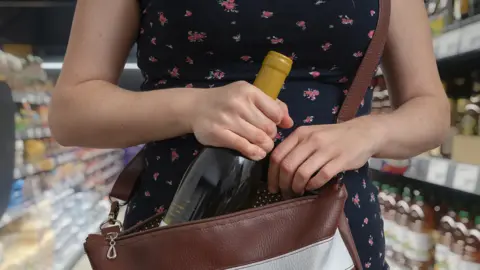Police to treat shoplifting like organised crime
 Get#
Get#Shoplifting will be targeted like organised crime as part of a plan to help police to crack down on theft.
A team of specialist analysts and officers is being put together to gather intelligence on crime gangs behind much of the shoplifting across England and Wales.
Retailers have complained police are failing to tackle rising shoplifting.
Under the plan, police have committed to attend more crime scenes and use facial recognition to target offenders.
A group of 13 retailers, including John Lewis, Tesco and the Co-op, have agreed to stump up almost £800,000 over two years to fund a partnership, known as Project Pegasus.
The majority of the money will finance a specialist police team that will work within OPAL, the national policing division that oversees intelligence on serious organised acquisitive crime.
The Home Office said the team was being put together to "build a comprehensive intelligence picture of the organised crime gangs that fuel many shoplifting incidents across the country, to help target and dismantle them".
The government will contribute £30,000 in the first year.
The plan also includes a police commitment to prioritise crime scenes where there has been violence against a shop worker, where security guards have detained an offender or where the police need to secure evidence.
Paul Gerrard, campaigns and public affairs director at the Co-op, said the retailer was hopeful that both Pegasus and the action plan "will mark the point at which the police will provide the support to protect shopworkers and shops so they can help the communities they serve thrive".
"The Co-op has long called for greater police prioritisation so they tackle the rampant rise in retail crime, especially those [crimes] involving violence or prolific offenders," he said.
James Lowman, boss of the Association of Convenience Stores, said the initiative would be "strongly welcomed" to combat "the torrent of thefts" businesses have been suffering.
"Using artificial intelligence to identify prolific offenders can be an effective way of drastically reducing the amount of police time it takes to make links between crimes committed against different businesses locally," Mr Lowman said.
He added, however, that the real challenge still remained apprehending thieves and stopping reoffending.
The Police Federation of England and Wales, which represents rank and file officers, said last week it needed more boots on the ground to tackle the problem.
The Policing Minister, Chris Philp, chaired a meeting on Monday with senior police leaders and 13 of the UK's biggest retailers. Mr Philp said shoplifting was a "blight" on the High Street and that bringing together government, policing and business would lead to "more joined up working when it comes to retail crime".
Official figures show that 365,164 shoplifting offences were recorded by police in England and Wales in the year to June - an increase of 25% on the same period last year.
However, the numbers are still below pre-pandemic levels. In the year to June 2019, there were 368,745 shoplifting offences recorded.
Shoplifting offences are not always reported to the police, so the actual number of instances could be much higher.
